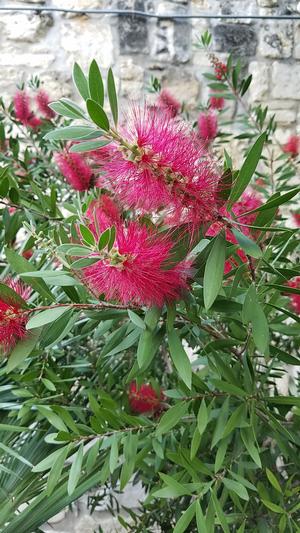
Mortellaro's Nursery
Print This Page


Bottlebrush
Callistemon citrinus
Discontinued
The Bottlebrush Tree originally hails from Australia, where it thrives in its native habitat. Its introduction to Texas landscapes has made it a beloved ornamental plant cherished for its vibrant blooms and lush foliage. Notably, when the foliage of the Bottlebrush Tree is crushed, it releases a pleasant citrus aroma, adding to its allure in the garden.
Bottlebrush Tree produces striking crimson-red flower spikes that look like bottle brushes, giving it the name. The vibrant blooms start in late spring and early summer, attracting pollinators like bees and butterflies. Each flower spike consist of numerous tiny individual flowers densely packed. Blooms last for several weeks to months.
While the Bottlebrush Tree adapts well to the diverse climates of Texas, gardeners should be mindful of its soil preferences, as it tends to prefer slightly acidic soil conditions. Additionally, providing fertilizer and mulch can promote healthy growth and enhance its overall vigor. However, in regions of central and north Texas where freezing temperatures are common, prolonged exposure to cold can damage its foliage and stems, and possibly killing it. To mitigate this risk, it's advisable to plant Bottlebrush Trees in sheltered locations or containers to go inside during cold spells.
 |
Flowering Tree |
 |
Hedge |
 |
Container Specimen |
Flower Color:Scarlet Red |
Height:12 Feet |
Spread:9 Feet |
Spacing:5 feet |
USDA Hardiness Zone 8a
Characteristics & Attributes
|
Deer Tolerance
|
Exposure
|
Habit
|
Soil pH Preference
|
||||||||
|
Water Needs
|

